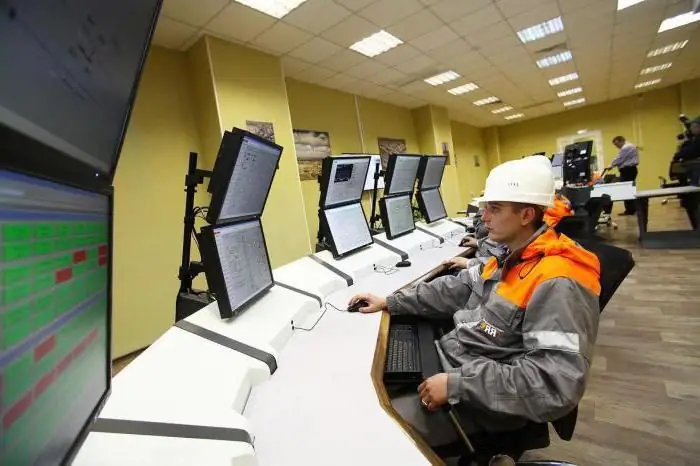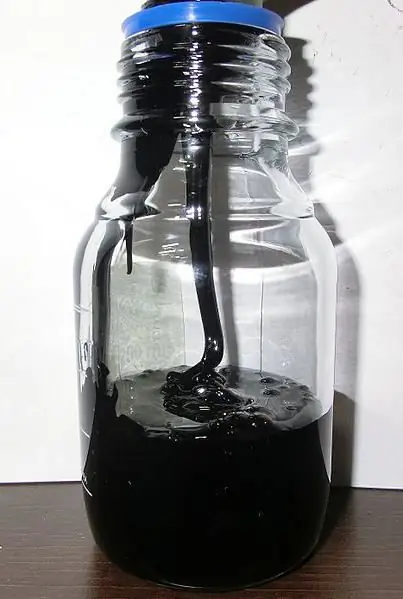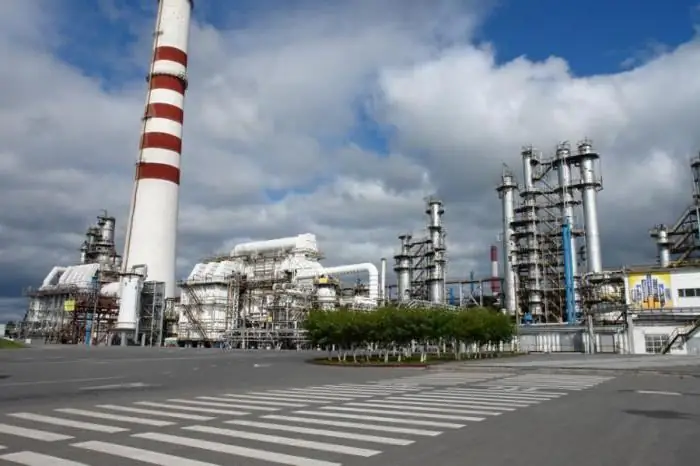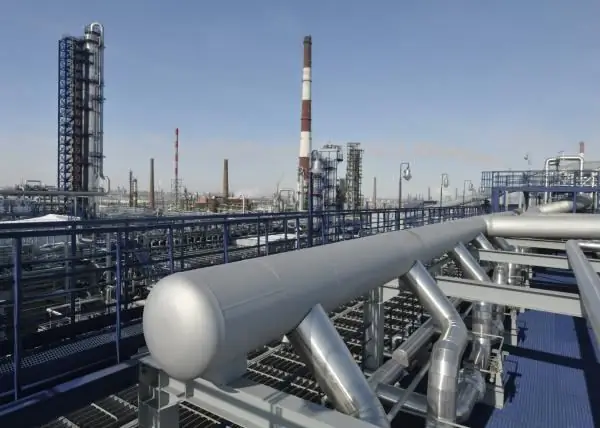2026 Author: Howard Calhoun | [email protected]. Last modified: 2025-01-24 13:10:30
Novoshakhtinsk Refinery is an oil refinery in the Rostov region, located northwest of the city of Novoshakhtinsk. The young enterprise, founded in 2005, belongs to the class of mini-refineries. The list of products includes marine, diesel and heating oil, fuel oil, gasoline.

Creation
With the decrease in the share of coal in the fuel sector and the gradual transition of a number of metallurgical and other industries to electricity, the production of solid hydrocarbons is declining everywhere. Miners and employees of service organizations have become hostages of the situation: layoffs and declining incomes have become a serious problem for the coal-mining regions. In 2004, the regional administration of the Rostov region adopted a resolution on the priority development of the Russian part of Donbass.
One of the promising projects, which made it possible to employ almost 2,000 people (not counting service companies), was the construction of the Novoshakhtinsk refinery. Construction work on the construction of the first stage began at the end of 2004. By October 2009, the main work was completed, andthe refinery has started processing oil products.

Modernization
As part of the expansion of the range of produced petroleum products in 2014, the production of high quality road bitumen was launched. The new workshop of the Novoshakhtinsk Refinery is capable of supplying customers with 700,000 tons of products annually. The characteristics of Rostov bitumen can significantly extend the life of the asph alt pavement.
In 2015, the stage-by-stage commissioning of the second stage of the Novoshakhtinsky Oil Refinery began. The new oil distillation unit of the ELOU-AVT series has a capacity of 2,500,000 tons of oil annually. After its commissioning, the capacity of the National Refinery doubled to 5,000,000 tons.
Transport service
The company does not have its own developed sales network, so it is important to provide efficient service to partners who purchase oil products for sale. The plant has a railway line and a highway with a high-quality surface. In order to expand the geography of transportation of finished products, a cargo terminal was built on the Don. It allows you to serve tankers with a carrying capacity of 5000 tons of river / sea class.
Oil mostly comes from the main pipeline at the Rodionovskaya - Sukhodolnaya section, operated by Transneft. Also, hydrocarbons can be delivered in tanks by rail.

Production
Novoshakhtinsk Refinery was commissioned in the second half of 2009. This yearThe NNPZ processed 464,000 tons of oil, in 2010 the productivity reached 1,910,000 tons. The enterprise produces mainly fuel oil (38% in the structure of oil products production in 2010), diesel fuel (25%) and naphtha (21%).
Another 12% came from various minor oil products. Among them, the most common are heating and marine fuels, which are similar in their characteristics to diesel fuel, but differ from it in a high sulfur content. It also produces technological export fuel and vacuum gas oil. The number of employees exceeds 1500.
Products
NNNPZ offers partners the following refined products:
- Industrial gasoline.
- Naftu (export straight-run gasoline).
- Diesel fuel class L-0, 2-62/40.
- Three types of marine fuel: DMA (DMA), RMF (RMG 380) and RMF (RMF 180).
- Fuel ash furnace series 40 and 100.
- Stove fuel.
Logistics
Novoshakhtinsk refinery sells almost all of its fuel oil on the domestic market. Diesel fuel, heating oil and SMT produced at mini-refineries are in demand on the domestic market due to the company's flexible pricing policy. Unlike VIOCs (large associations), a small enterprise reacts faster to changes in the situation on the spot market of oil products in Russia.
Price policy is an important selling factor. Many industrial enterprises and agricultural producers still operate outdated equipment, for which the increased sulfur content in diesel fuel is notis a problem. On the contrary, the price of fuel for such consumers is usually the most significant criterion. NOR offers products slightly cheaper than large companies, which is beneficial for everyone.

Growing problems
According to the requirements of the government, all refineries were required to modernize their capacities for the production of fuel, first of the Euro-4 standard, and by the end of 2015 - Euro-5. However, not all companies found enough funds for a large-scale reconstruction. Claims were also made against the Novoshakhtinsk oil refinery.
The leadership of the Novoshakhtinsky refinery assured that the work is progressing. A contract was signed with Chinese partners who are ready to finance the project. The administration plans to build the next stage to ensure the depth of oil refining up to 95% and bring the quality of products to Euro-5 standards.
Ecology
Even at the planning stage of the enterprise, norms were laid down to radically reduce harmful emissions. The system of wastewater treatment plants uses the latest technologies to capture and neutralize hazardous substances that inevitably form in the chemical industry.
The treatment complex consists of:
- From two recycled water treatment systems.
- Filtration zones.
- Water treatment area with reagents.
- Physical-mechanical cleaning section.
- Flotation and ultraviolet disinfection zones.
- Sand trap device.
- Oil traps.
- Settingsoil sludge processing.
Protective measures are designed to prevent contamination of the region's waters and soils.
Recommended:
Yaya Oil Refinery. Yaya oil refinery (Kemerovo region)

Yaya Oil Refinery "Severny Kuzbass" is the largest industrial enterprise built in the Kemerovo region in recent years. It is designed to reduce the acute shortage of fuel and lubricants in the Altai-Sayan region. The design processing capacity of the first stage is 3 million tons, the introduction of the second stage will double the output
Oil is a mineral. Oil deposits. Oil production

Oil is one of the world's most important minerals (hydrocarbon fuel). It is a raw material for the production of fuels, lubricants and other materials
JSC "Achinsk Oil Refinery of the Eastern Oil Company"

The Achinsk Oil Refinery of the Eastern Oil Company (AO ANPZ VNK) is the only large oil refinery in the Krasnoyarsk Territory. The plant's capacities allow processing about 7.5 million tons of crude oil annually
Oil production in the world. Oil production in the world (table)

The world as we know it would be very different if there was no oil. It is hard to imagine how many everyday things are created from oil. Synthetic fibers that make up clothing, all plastic used in everyday life and industry, medicines, cosmetics - all this is created from oil. Almost half of the energy consumed by mankind is produced from oil. It is consumed by aircraft engines, as well as almost all vehicles in the world
Syzran Refinery. Oil refining industry. Refinery

Oil is one of the most important assets of our country, since not only the financial position of our state, but also its energy security directly depends on the "black gold". One of the pillars of the domestic oil refining industry is the Syzran Refinery

